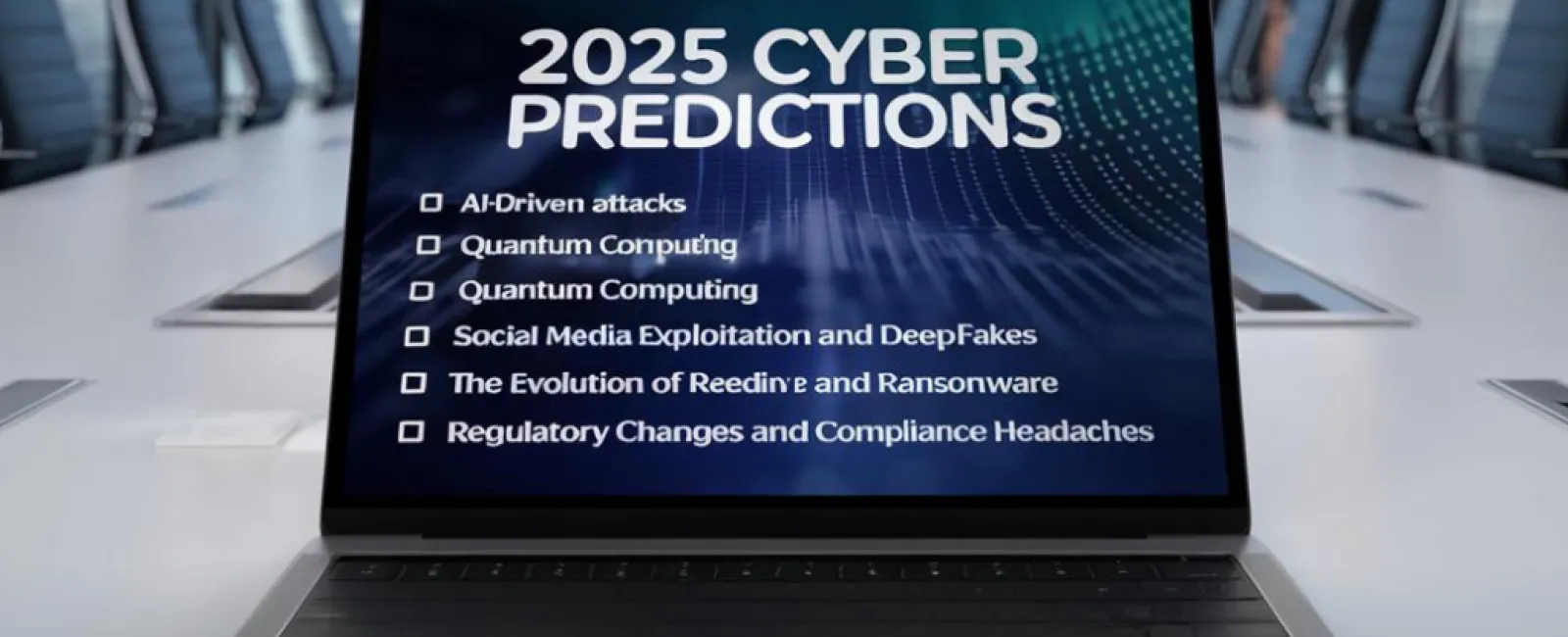December 09, 2024
Cyberthreats have advanced at such a rapid pace that scenarios once confined to science fiction are now part of our reality. As we approach 2025, the landscape of cybersecurity is being reshaped by AI-driven attacks and the potential of quantum computing, presenting both innovative and alarming challenges. Here's a glimpse into some of the major threats on the horizon and how small and medium-sized businesses can start preparing today.
1. AI-Driven Attacks: More Intelligent, Quicker, and Harder to Identify
Artificial intelligence serves as a double-edged sword in cybersecurity. While it enhances defensive measures, it also empowers cybercriminals. By 2025, AI is expected to significantly aid hackers in crafting highly targeted phishing schemes, creating malware that adapts in real-time, and automating attacks that outpace traditional security measures.
Preparation Tips: Invest in advanced detection technologies that leverage machine learning to identify these sophisticated attacks. Educate your staff on recognizing AI-enhanced phishing emails that appear highly personalized and authentic. Staying ahead of AI requires both a robust technological arsenal and human vigilance.
2. Quantum Computing: A Potential Threat to Current Encryption
Quantum computing, once theoretical, is advancing rapidly and could potentially undermine many of today's encryption standards. Unlike conventional computers that process data in bits, quantum computers use qubits, enabling them to solve complex problems much faster. While not imminent, by 2025, quantum advancements could begin to challenge our data protection measures, providing hackers with tools to crack even the strongest encryptions.
Preparation Tips: Begin exploring quantum-resistant encryption if you haven't already. Early adoption will better position you as quantum technology progresses. Incorporate this into your long-term cybersecurity strategy to avoid last-minute scrambling.
3. Social Media Exploitation and Deepfakes: The Rise of Misinformation
Social media is a powerful tool, both positively and negatively. In 2025, expect an increase in the use of social media for spreading misinformation and executing complex social engineering attacks. Deepfakes—realistic yet fake audio and video content—pose a threat by impersonating executives, clients, or other trusted individuals.
Preparation Tips: Foster a culture of verification within your organization. Encourage employees to be wary of unexpected requests, even those that seem legitimate. Training and awareness are crucial defenses, equipping your team to identify manipulated content and social media scams before falling victim.
4. The Evolution of Ransomware: A More Personal Threat
Ransomware attacks have evolved beyond data encryption to include data leakage threats. By 2025, double extortion will likely become standard practice, with cybercriminals not only locking systems but also threatening to release sensitive information unless paid. New sectors, such as critical infrastructure, healthcare, and supply chains, are increasingly targeted, with potentially catastrophic consequences.
Preparation Tips: Strengthen your incident-response planning and invest in backup solutions that enable quick recovery without paying a ransom. Regularly test your backups and keep them off-network when possible to prevent compromise. While ransomware may be unavoidable, being prepared can prevent it from crippling your business.
5. Regulatory Changes and Compliance Challenges: A Call to Action
As cyberthreats escalate, governments worldwide are tightening data protection and cybersecurity regulations. By 2025, businesses will likely face stricter requirements for data handling, privacy, and incident response. Navigating these regulations can be challenging, especially for international operations where compliance demands vary.
Preparation Tips: Stay informed about regulatory developments in your industry and region. Assign a team member or hire a consultant to monitor changes and ensure compliance. Integrating compliance into your cybersecurity strategy not only helps avoid legal issues but also enhances overall security.
Conclusion: Preparing for the Future of Cybersecurity
Cyberthreats are not slowing down; they are evolving, adapting, and becoming increasingly sophisticated. The best strategy? Begin preparations now. Equip your business with AI-driven defenses, explore quantum-resistant encryption, train your team to detect deepfakes, strengthen your ransomware response plan, and keep compliance efforts current.
If these predictions have you rethinking your cybersecurity strategy,
now's the time to act. Reach out for a FREE Discovery Call,
and we'll help ensure your business is ready to face the future of
cybersecurity head-on. Click here or call us at 907-290-2571 to schedule
now!




